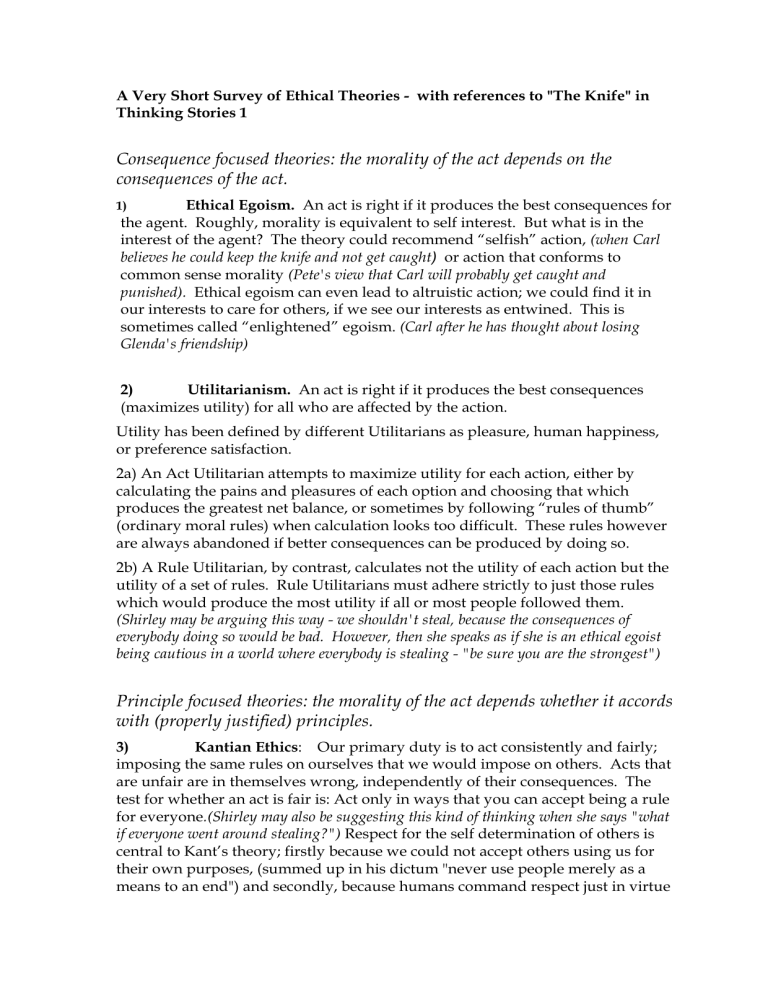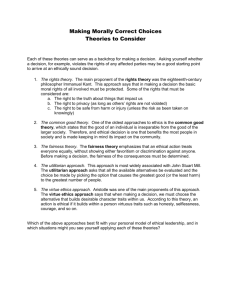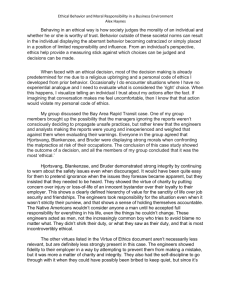v.short theories

A Very Short Survey of Ethical Theories - with references to "The Knife" in
Thinking Stories 1
Consequence focused theories: the morality of the act depends on the consequences of the act.
1) Ethical Egoism. An act is right if it produces the best consequences for the agent. Roughly, morality is equivalent to self interest. But what is in the interest of the agent? The theory could recommend “selfish” action, (when Carl believes he could keep the knife and not get caught
)
or action that conforms to common sense morality (Pete's view that Carl will probably get caught and
punished). Ethical egoism can even lead to altruistic action; we could find it in our interests to care for others, if we see our interests as entwined. This is sometimes called “enlightened” egoism. (Carl after he has thought about losing
Glenda's friendship)
2) Utilitarianism. An act is right if it produces the best consequences
(maximizes utility) for all who are affected by the action.
Utility has been defined by different Utilitarians as pleasure, human happiness, or preference satisfaction.
2a) An Act Utilitarian attempts to maximize utility for each action, either by calculating the pains and pleasures of each option and choosing that which produces the greatest net balance, or sometimes by following “rules of thumb”
(ordinary moral rules) when calculation looks too difficult. These rules however are always abandoned if better consequences can be produced by doing so.
2b) A Rule Utilitarian, by contrast, calculates not the utility of each action but the utility of a set of rules. Rule Utilitarians must adhere strictly to just those rules which would produce the most utility if all or most people followed them.
(Shirley may be arguing this way - we shouldn't steal, because the consequences of everybody doing so would be bad. However, then she speaks as if she is an ethical egoist
being cautious in a world where everybody is stealing - "be sure you are the strongest")
Principle focused theories: the morality of the act depends whether it accords with (properly justified) principles.
3) Kantian Ethics: Our primary duty is to act consistently and fairly; imposing the same rules on ourselves that we would impose on others. Acts that are unfair are in themselves wrong, independently of their consequences. The test for whether an act is fair is: Act only in ways that you can accept being a rule for everyone.(Shirley may also be suggesting this kind of thinking when she says "what
if everyone went around stealing?") Respect for the self determination of others is central to Kant’s theory; firstly because we could not accept others using us for their own purposes, (summed up in his dictum "never use people merely as a means to an end") and secondly, because humans command respect just in virtue
of the fact that they are free and autonomous. All principles which govern action should pass Kant's consistency test.
4) Social Contract Theory: We should be governed by those principles that would be chosen by rational, self interested, and impartial agents who want to live in a safe society. (When Shirley says "be sure you are the strongest" she might be suggesting that rational, self interested and impartial person should agree to rules that
would protect them if they were weak)
Note: Principles may also be justified using a Rule Utilitarian approach, or may be derived from religious doctrine. Rights-based approaches also fit into this category.
Character focused theories: morality is primarily concerned with character; moral action is action that manifests a certain character.
5) Virtue Ethics: Our actions spring from our habitual responses; if these are virtuous, we will naturally desire to do good. (Glenda says "what if you
just don't like stealing?) A virtue is a trait of character that conduces to human flourishing. Once the virtue (e.g. honesty) is acquired, the agent values it for its own sake. (Glenda: "even if stealing wasn't against the law, I'd never steal just because
to me it is wrong) Virtuous people do not need rules or principles, for their good character and their capacity for practical wisdom (an important virtue) will enable them to make good judgments in particular situations. In Aristotle's virtue ethics, a true friend must be someone who shares your commitment to the virtuous life. (Glenda: "I don't think I'd want a thief for a friend")
6) Ethics of Care: Can be seen as a kind of virtue ethics, in which the focus of ethics is on relationships and the primary virtue is that of caring. The ethics of care rejects rules as being too general, too rationalistic and too impartial to be of use in relationship to particular individuals. The only "rule" is - maintain caring relationships.
The theories above are all normative ethical theories; they offer an action-guiding account of right and wrong, or good and bad. Meta-ethical theories offer an account, not of what is right or wrong, but what makes claims about right or wrong true or false.
7) Ethical Relativism. A moral claim such as “stealing is wrong” is true when:
7a) the person who says “stealing is wrong” believes that it is wrong,
(Subjectivism) or
7b) the person who says “stealing is wrong” belongs to culture in which the majority believe that stealing is wrong. (Cultural Relativism)
Ethical Relativism entails that there is no objective standpoint from which to evaluate the truth of moral claims; their truth is always relative to the beliefs of the speaker, or the beliefs of the group they belong to. (Glenda MAY be suggesting
this when she says " I'd never steal just because to me its wrong")
Some suggestions for further reading:
James Rachels, The Elements of Moral Philosophy, McGraw-Hill.
A good, accessable introductory text on ethical theories. Keep an eye out for second hand copies - it has been an undergraduate ethics text at Auckland for ages. Four editions - the later ones have material on virtue ethics and care.
Utilitarianism has a keen supporter in Peter Singer, who has many books published, a number of which focus on the ethics of our treatment of animals.
Singer's Practical Ethics is an interesting discussion of a number of issues
(animals, abortion, euthanasia, world hunger) from a utilitarian perspective.







